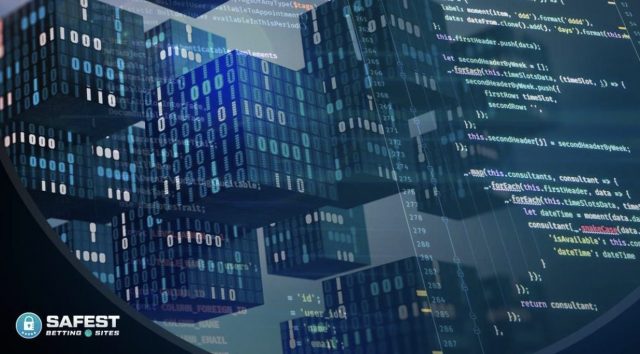If you are exploring cryptocurrencies or blockchains for business use, understanding blockchains are fundamental to expanding how these digital tools can help with everyday contracts and cryptocurrency transactions. Because this new technology is rapidly evolving, adopting blockchain ideations can help your business with real-world applications beyond cryptocurrency usage.
As they drive innovation and reshape contract negotiations, blockchain sectors can include finance, supply chain management, healthcare, governance, security, real estate, travel, and entertainment.
Below we will explore blockchain usage in various business sectors and what to expect with this new digital, decentralized ledger.
What is Blockchain Technology?
Blockchain technology records cryptocurrency trades like digital ledgers. When buying, trading, and selling cryptocurrencies, blockchains keep an accurate and tamper-proof ledger with information safely secure from the different parties.
Because there is no centralized government that oversees this cryptocurrency market, there is no third-party control. Hence, cryptocurrencies like Bitcoin are global currencies with the same type of value globally.
Blockchain technology works by storing data from a transaction in blocks. The users with access to the blockchain can add more data to the initial block and create a chronological chain that transparently retails all original data and activity (like redlining a document). Hence, every blockchain is irreversible and offers the most heightened security.
Cryptocurrency examples are Litecoin, Bitcoin, and Ethereum, and can securely process and record payment transactions.
How Blockchains Work
To understand how blockchains can be used based on your particular industry, explore blockchain technology and how blockchains or deconstructed ledgers help with smart contracts and transactions online.
Blocks: Because blockchains make up a series of blocks, whenever a person initiates a contract, starts a new transaction, or adds to existing blockchain data, it generates a new block with a cryptographic hash linking it to the recent chain of blocks. It also notes the date, time, and other transactional information in chronological order.
Hence, you can record new blocks of information on existing blocks located globally, and you
are not limited to a few devices. The result is transparent, accessible, and completely secure, permanent records.
Mining: With mining, users can add blocks to blockchains to update them and generate new coins. In this example, miners would validate a blockchain transaction by solving a cryptographic hash puzzle with advanced, high-level computer equipment.
When the transaction is validated, the user can update the records and add them to the blocks in that ledger.
An example of this type of mining is a cryptocurrency like Ethereum, while an example of someone who can solve hash puzzles might be a blockchain mining engineer or developer.
Nodes: Nodes are special computers that proficiently run blockchain software.
As the nodes create a network, they run in a blockchain on the computer database. Nodes will update with the most recent version of the blockchains in real-time. Hence, users always have real-time versions of their transactions, contracts, and payments to reference.
Blockchains in Cryptocurrencies and Beyond
When using blockchains for digital currencies, cryptocurrencies like Bitcoin are the most common example people know. However, CoinMarketCap estimates that there are more than 23,000 cryptocurrencies at present.
Blockchains as digital currencies are very successful. Multiple organizations are turning to cryptos to remove third-party fees and reduce human error (mathematical mistakes, lost, damaged, tampered with paperwork).
Using blockchains as a currency is becoming popular with real money gambling sites, banks, and travel.
As wide-scale digital coins, this is another example where the payment transactions are completely secure, fully transparent, and ideal for users that want to buy and sell cryptocurrencies.
Because they require specific conditions, smart contract codes are only released to a user once they meet the requirements. As blockchains can improve contract templates, they are critical to accepting payments and do not require third-party intermediaries.
If you follow the latest crypto news, smart contracts are one of the best ways to simplify online transactions and secure payments.
Processing payments for financial transactions
Blockchains can simplify foreign and domestic transactions, reduce or eliminate transaction fees, and improve transparency and transaction security. In 2017, Visa started using blockchains for their international payments.
Recording real estate transactions and maintaining property records
Blockchains are ideal for property managers, realtors, and tenants as they are widely available and completely safe. With public accessibility available, a realtor can set up and follow a contract’s paper trail and accept payment from a new tenant.
Maintaining HIPAA compliance and securing patient records
Keeping patient data private is essential to maintaining hospital confidentiality. Blockchains can secure patient data, create medical data hubs, and even help track and trace disease outbreaks.
With decentralized ledgers in secure databases, providers and their patients do not have to worry about security breaches, with all data in one central system vulnerable to hackers.
Streamlining supply chains and logistics
Blockchains can optimize data for shippers, manufacturers, and clients and maintain real-time records. With all parties in the loop, coordination and communication reduce human errors and shipping complaints.
Tracking election voting records
Blockchains are capable of helping election officials improve trust by providing tamper-proof, transparent records. Capable of reducing voter fraud, each ballot is traceable and matches a single voter ID.
Advantages with Blockchains
Blockchains include several opportunities like recording, storing, recording, and securing data. Hence, they can increase privacy globally. Other advantages include:
Anonymity
Blockchains let users create private transactions with pseudonyms without revealing their identity. While the records are public, user identity is not disclosable.
Cost
Blockchains lower transaction costs as they cut out a third-party middleman (banks or law firms, for example, which serve as intermediaries as smart contracts can streamline transactions.
Decentralization
Because blockchains are decentralized, users have consistent records globally which reduces human errors and provides accurate, real-time data.
Privacy
Encrypted data mitigates corruption as private key authentication can protect information and let network administrators limit data access or block it.
Records
With distinct cryptographic signatures, blockchains validate the information and prevent tampering. With the data across multiple devices, records last forever.
Security
Because they are not centralized, hackers are not capable of corrupting blockchains. They continually update to nodes globally and provide indisputable transaction and data records.
Processes
Blockchain templates are available for smart contracts to give businesses more transparency and hack-proof transactions, which can expedite payment processing times.
FAQ
What are blockchain salaries and job titles?
Blockchain quality engineers (like software quality engineers) can make $101,096, while developers who develop smart contracts and dApps can make $90,942.
What requirements are necessary for a blockchain career?
Students should focus on blockchain technology based on their profession. A UX designer might explore how their previous projects will integrate into blockchain spaces.
What skills do technicians need to work with blockchains?
They should have a background in computer science, smart contracts, cryptography, programming, and data science.
The Future of Blockchains
With so many applications and usages, blockchains are an innovative game-changer helping multiple industries. As businesses adopt these new technologies, more opportunities will open up for using blockchains and protecting and tracking data.









